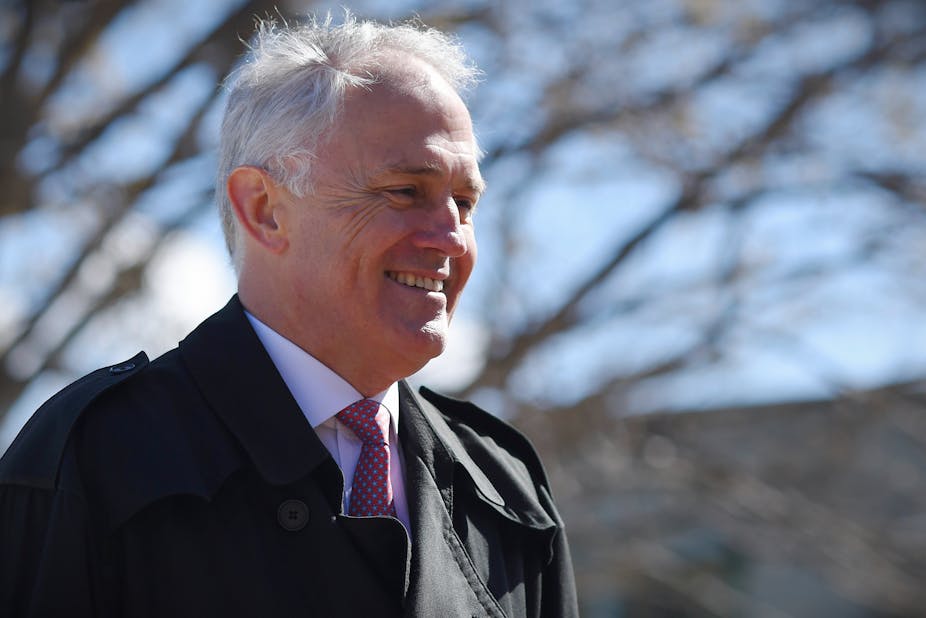Malcolm Turnbull, it seems, cannot escape the emissions trading scheme (ETS) bogey. This time, it comes in the form of China’s plan – which had been foreshadowed but is now confirmed – to introduce a national ETS.
Turnbull’s desire to do a deal with prime minister Kevin Rudd in 2009 for an ETS triggered the leadership contest that installed Tony Abbott as leader. The push against an ETS came from conservative Liberals, many of them climate change sceptics, and the Nationals.
After he was toppled as opposition leader Turnbull continued to strongly defend an ETS. Later, as a shadow minister and a minister he had to get fully on board with Abbott’s Direct Action.
More recently Turnbull went further. To win the vote of some conservative Liberals, who were needed for him to have the numbers to topple Abbott, Turnbull made it clear that as prime minister he would stick with the present policy and not contemplate an ETS.
When he got the leadership, he had to commit in writing as part of his Coalition agreement with the Nationals that he would maintain existing policies on climate change, carbon taxes and emissions reductions targets.
Sacrificing his views brought him support, but has left him looking on the wrong side of history – after earlier being on the right side of it. It is embarrassing, to say the least, that his expediency has been highlighted so quickly.
In terms of domestic politics, China’s decision should give some assistance to Labor, which has promised an ETS although it has not yet released the details.
Environment Minister Greg Hunt, who also used to believe in an ETS, is left arguing that Australia, with its taxpayer-funded emissions reduction fund, has “the best, most effective scheme in the world”, a claim that does not pass the credibility test.
Turnbull has a double problem. He knows Australia doesn’t have a gold-standard anti-emissions policy. And he is wide open to the charge of hypocrisy.
The Climate Institute’s John Connor says that with other countries broadening their emissions-reduction policies, “the prime minister is dancing around the reality that our policy toolbox is going to need a whole lot more in it”.
This will present problems for Turnbull as he approaches the election and – if the government is re-elected – beyond it.
In the run up to the poll is he just going to deny his past and go for an all-out attack on Labor’s ETS?
Will he at some point augment or change Direct Action to ensure that it has more bite and is fit for purpose as other countries ramp up their efforts? If so, how and when would that be done?
And what room to move will the Liberal conservatives and the Nationals give him to make necessary adjustments?
Frank Jotzo, director of the Centre for Climate Economics and Policy at the Australian National University, thinks Turnbull will look for a way through.
“The plan may well be to gradually reform the Direct Action scheme to make it work a bit like an ETS – for example by giving the present ineffective safeguards regime some teeth. But that would be very much inferior compared to a proper carbon pricing scheme.”
Connor believes the move by China and others “will give Turnbull more flexibility in arguing for stronger policies within his own team. He can point to much more robust policies abroad and dispel fantastic notions, popular amongst conservatives from 2009-12, that Australia was at risk of leading the world.”
As Connor points out, the irony is that if Turnbull had prevailed in the 2009 leadership vote and carried the deal with Rudd, Australia would have had an ETS policy, alongside stronger renewable energy and energy efficiency policies he supported with Rudd, leaving it in a better position with its climate policy now.
Abbott’s ascension not only stopped that ETS deal but ensured the Gillard government’s emissions reduction scheme – which never got the chance to reach its full form as an ETS – was repealed after he won government.
Now, from beyond the political grave, Abbott’s inadequate climate policy still reigns, a challenge for his successor into the future.

